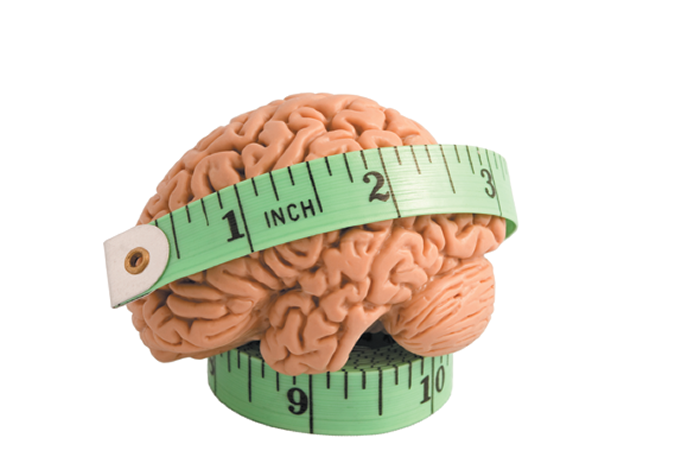A large Korean population study recently published in the journal Obesity found that abdominal obesity, as measured by waist circumference, was associated with significantly higher risk of dementia. The study included over 872,000 participants aged 65 years and older.
Participants with waist circumference of 90 centimeters (cm) or above for men and 85 cm or above for women (about 35 and 33.5 inches, respectively) showed a significantly higher risk of dementia even after adjustment for other variables. The lowest risk for dementia was observed in older men with waist circumference of 65 to 70 cm and in older women with waist circumference of 75 to 80 cm. (The particular waist measurements associated with dementia could be different in people of non-Korean ethnicity.)
Results of previous studies on this topic using Body Mass Index (BMI) have varied. The authors of this study point out that the waist circumference measure utilized in their study is a more accurate indicator of harmful abdominal visceral fat (the kind of fat that builds up in and around organs). Keeping body weight down to reduce waist circumference may be a powerful tool in protecting brain health.

























Excellent study reviewing the effect of metabolic syndrome. Less food is always beneficial with our evolutionary determined genetics.
I have read this before, but it’s very difficult to know exactly where to measure your waist. Is it just above your hips, where you generally wear your pants, or is it lower, around your belly button? The lower area is, of course, much bigger, especially in senior women. I’d love a definitive reply.
It’s just above your hip bones, tape horizontal and snug (but not compressing the skin), after exhalation.
This has instructions and a visual depiction. https://www.cdc.gov/healthyweight/assessing/index.html
Over the belly button
Baloney.
Baloney? Too much fat in it and processed meat.
Did you confuse men and women for healthy waist size, should be 65-70 cm for older women and 75-80 cm for older men?
Obesity is also a risk factor for certain types of cardiovascular disease, which in turn is a risk factor for ischemic lesions in the brain, which often results in dementia. Did there authors distinguish among the various types of dementia?
Similar studies have to be done on multiple ethnic groups who vary in the size of their skeletal structure as it is visceral fat that is being indirectly measured and is the apparent direct risk measure for dementia.
I’m 125 pounds and have done every exercise program, including HIIT but the belly fat remains. I am very stressed and I’m told this is the cause (cortisol), but I cant get rid of the causes of my stress. Basically, other people in my life are giving me this stress. (93 year old mother, hard of hearing husband, expenses on mothers house, and more) . I’m a vegan too!
Pranayama practices will reduce your stress
I can help. It is not about money.
Retired and helping others is my passion
Are we to conclude that abdominal obesity causes dementia?
Can you tell us where/when the study was published so that we can read the article and see what limitations in the study may exist and what alternative explanations were considered.
The report doesn’t differentiate for people who have varying reasons for having large waistlines.
In one case, a woman has severe scoliosis (curved spine). The S-curve of the spine is so great that it
has raised her waistline almost 2″ in the front and back, moving all her organs, including belly, up by 2 inches,
and wider to almost 40″. In this case, no matter how much she diets, she will never be able to drop or reduce the
waistline. Certainly, maintaining a good weight is the way to start, but in some cases it won’t change physical
structure.
I believe genetics plays a HUGE role in physical and mental well being. My mother-in-law is going to be 94 yrs old and she is is 5’1″ and almost 200#. She has much abdominal fat and mentally, she is sharp as a pin! Her memory is incredible! She is definitely a “super ager.” She smoked more than half her life, ate meager amounts of fruits and vegetables, and she continues to eat Pop Tarts for breakfast!
Don’t forget that as people age, they shrink in height. I’m 97, and have shrunk at least 3 inches. Because my trunk is shorter, the contents have to go somewhere, so I have a large belly–but weigh only 100 pounds, 10 pounds less than I did 5 or 6 years ago.
I am 187 centimeters tall. To get my tummy circumstance under 85 centimeters (I am a woman) I would get so skinny people ask me if I am anorexic.
Are there exceptions in case of a tall body?